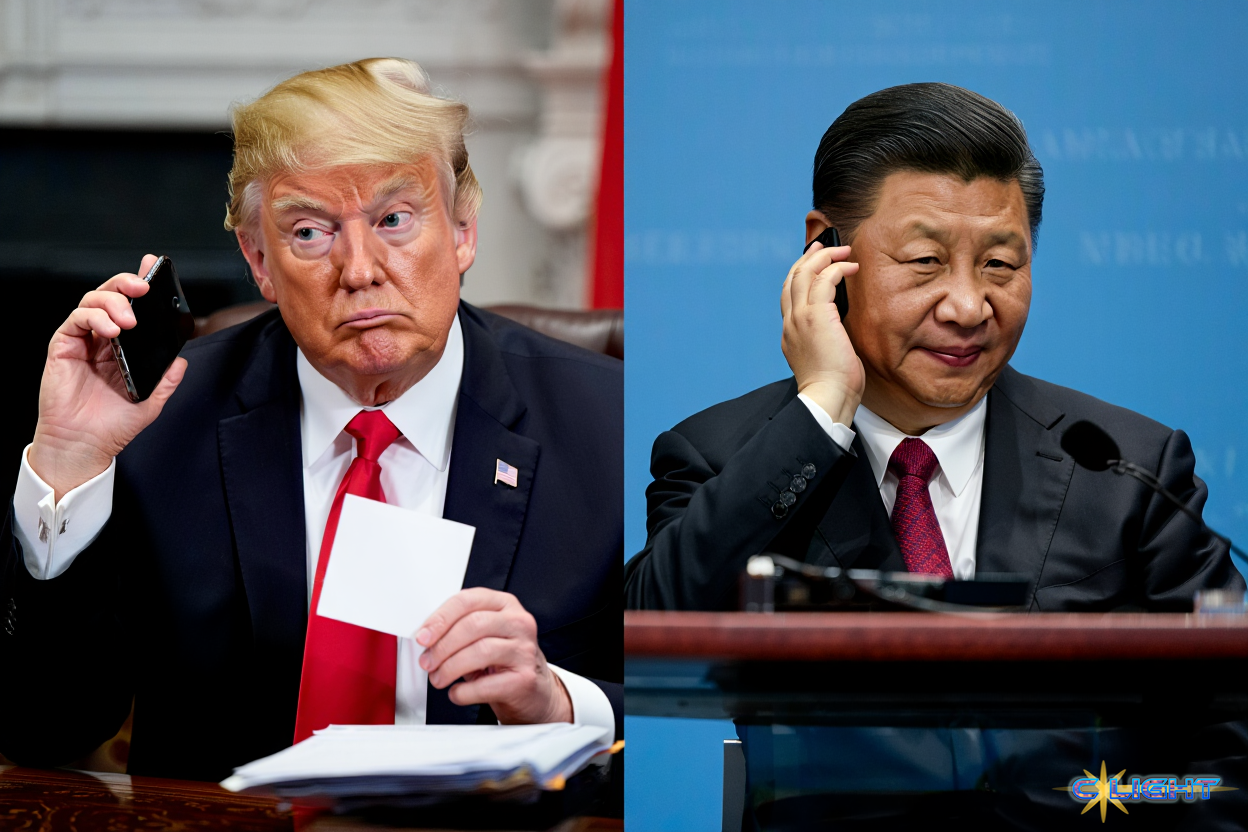In a whiplash-inducing display of diplomatic contortionism that has become a hallmark of his leadership, US President Felonious Punk on Thursday executed another stunning rhetorical reversal following a high-stakes phone call with Chinese President Xi Jinping. After days of bellicose pronouncements, accusing China of violating agreements and branding Xi “VERY TOUGH, AND EXTREMELY HARD TO MAKE A DEAL WITH,” Felonious Punk emerged from the 1.5-hour conversation to declare a “very positive conclusion for both Countries” and assert that the fraught US-China trade relationship was now “in very good shape.” This abrupt pivot, however, when juxtaposed with China’s firm demands and the conspicuous absence of concrete concessions from Beijing on critical U.S. concerns, paints a deeply unsettling picture—one that many observers are viewing as another glaring instance of the “Trump Always Chickens Out” (TACO) phenomenon, culminating in a significant strategic win for China.
The call, initiated at Felonious Punk’s request, was ostensibly aimed at breaking an impasse over escalating tariffs and China’s chokehold on global supplies of rare earth minerals essential to U.S. industry and defense. Felonious Punk triumphantly claimed on social media that “there should no longer be any questions respecting the complexity of Rare Earth products,” implying a resolution. Yet, neither official Chinese readouts nor independent analyses offer any substantive evidence that Beijing has agreed to meaningfully relax its export controls or cede this crucial point of leverage. As Yun Sun, director of the China program at the Stimson Center, noted, “The Chinese are reluctant to give up their leverage so easily.” Reuters, too, bluntly stated, “It was not clear from either country’s statements that the issue had been resolved.” Felonious Punk’s assertion, therefore, appears to be more wishful thinking or deliberate obfuscation than a reflection of reality—a projection of victory where none is apparent.
In stark contrast to Felonious Punk’s effusive optimism, Chinese accounts of the call depicted President Xi as taking a decidedly assertive stance. Xi reportedly urged Felonious Punk to “remove the negative measures” the U.S. has imposed, called for Washington to handle the sensitive Taiwan issue “prudently” to avoid a “dangerous situation of conflict and confrontation,” and stressed that while China is sincere about negotiating, it “has its principles.” This is hardly the language of a party making concessions. Instead, it portrays a Chinese leadership standing firm, essentially dictating the terms under which dialogue might continue, while the American president publicly smooths over the deep fissures.

Indeed, several outcomes of the call can be interpreted as direct U.S. capitulations. Felonious Punk’s declaration that “Chinese students are coming. No problem… It’s our honor to have them,” represents a significant walk-back from his administration’s recent moves to revoke visas for some Chinese students and its broader rhetoric portraying them as potential security risks. This reversal, offered without any visible quid pro quo from Beijing, appears to be a direct concession to a Chinese demand. Furthermore, the mere agreement to dispatch a high-level U.S. delegation—comprising Treasury Secretary Scott Bessent, Commerce Secretary Howard Lutnick, and U.S. Trade Representative Jamieson Greer—for further talks, without upfront, verifiable commitments from China on core U.S. grievances, can be seen as Beijing successfully resetting the negotiating clock to its advantage.
This episode fits a well-documented pattern. As Reuters aptly observed, “Since returning to the White House in January, Trump has repeatedly threatened an array of punitive measures on trading partners, only to revoke some of them at the last minute. The on-again, off-again approach has baffled world leaders and spooked business executives.” This “TACO” dynamic was evident in the lead-up to the call. In early April, Felonious Punk had escalated U.S. levies on Chinese goods to a crippling minimum of 145 percent, prompting Chinese retaliation of 125 percent on U.S. imports, effectively halting trade. By mid-May, following the Geneva talks, these tariffs were temporarily rolled back (U.S. to 30%, China to 10%) for a 90-day period. However, when China seemingly didn’t deliver on U.S. expectations regarding rare earths under this truce, Felonious Punk resumed his aggressive rhetoric, only to initiate this call and emerge with broad, unsubstantiated claims of success.
It appears China’s strategic application of pressure, particularly its control over rare earth minerals, which threatened to bring some American factories, including crucial defense industries, to a standstill, forced Felonious Punk’s hand. Beijing, acutely aware of this leverage, seems to have played its cards effectively, securing a de-escalation and a return to the negotiating table largely on its terms, all while maintaining its firm stance on its “principles” and its criticisms of U.S. policy. Xi’s carefully worded statement about wanting to “improve consensus, reduce misunderstanding and strengthen cooperation,” while sounding conciliatory, also subtly places the onus on the U.S. to “correct the course” of the “big ship” of bilateral relations by withdrawing its “negative initiatives.”

The fundamental, deep-seated issues—China’s state-dominated economic model, its push for technological supremacy in areas like AI and EVs, U.S. concerns over a $295 billion trade imbalance (2024), intellectual property theft, human rights, the illicit fentanyl trade, and the ever-present flashpoint of Taiwan—remain profoundly unresolved. Felonious Punk’s assertion that the call focused “entirely on trade,” excluding critical geopolitical matters like Ukraine or Iran, further suggests a narrowing of the U.S. agenda, potentially at China’s behest or due to a U.S. desire to secure even a superficial “win” on the trade front.
Ultimately, Thursday’s diplomatic theater, stripped of Felonious Punk’s characteristic hyperbole, looks less like a breakthrough for American interests and more like a testament to China’s growing confidence and leverage on the global stage. While dialogue is preferable to open conflict, a dialogue entered into from a position of perceived weakness, marked by rhetorical backpedaling and unsubstantiated claims of victory, serves primarily to underscore a strategic win for Beijing. The “TACO” moment appears to have arrived, leaving critical American interests hanging in the balance and raising serious questions about the coherence and credibility of U.S. policy toward its most significant geopolitical rival.
Discover more from Clight Morning Analysis
Subscribe to get the latest posts sent to your email.










